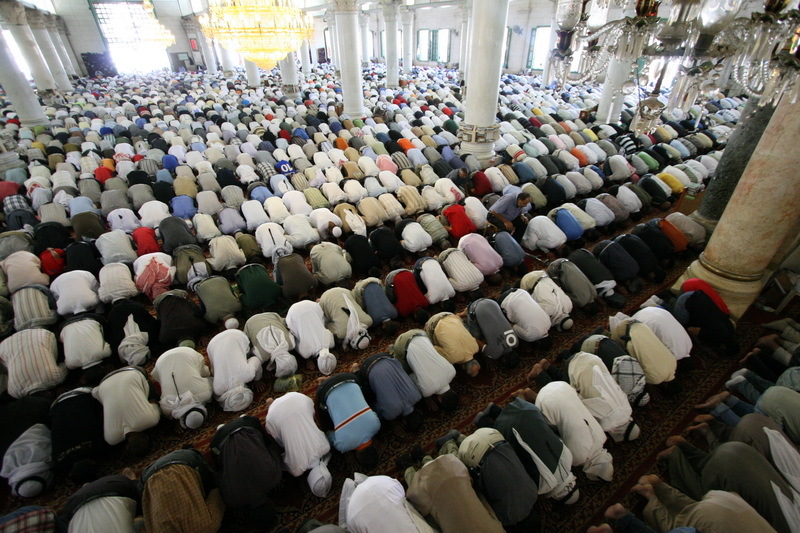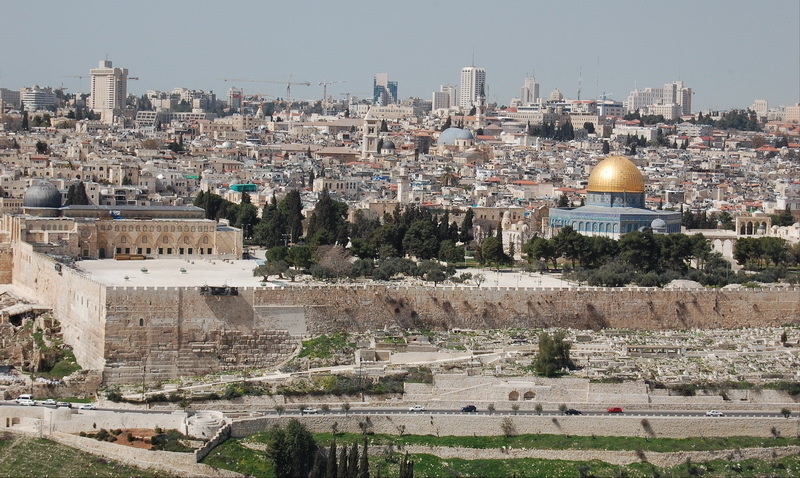When some said, “At least 100,000 people will show up here tonight,” I could not believe in them and thought, “They would perhaps say 10,000 but mistakenly said 100,000;” however, I began to understand the reality when I saw the streets of Jerusalem being filled with people, spread of excitement and hurry everywhere, traffic congestion and the jamming of narrow streets and gates opening to the Masjid al-Aqsa. While those living in Jerusalem took to the streets, those coming from outside the city were flocking to the city on buses and were forcing the wall of shame constructed by Israel.
We went to see the wall which separated Jerusalem from other regions of Palestine and listen to the stories of those who could not come to the city. The Israeli police and military which took intense security measures at the check points were trying to prevent the entry of those who want to come to the city. The sounds of tear gas bombs were being heard from time to time. They angrily forced us to leave. It is so painful to see it clearly there the wall which separates Jerusalem from the West Bank also separates neighbors and families from each other. With an eight-meter-height wall in between, Palestinians are forced to live in an open prison in Jerusalem and the West Bank. Only those above the age of 60 were allowed to enter Jerusalem.
The hatred, impatience and heartbreaking efforts of particularly the youth to reach Masjid al-Aqsa are seen in the slogans written on the walls. It is an irresistible desire for them to be in Masjid al-Aqsa at least on this night but they cannot achieve it. Those who could make it to Jerusalem by the use of illegal means are detained by Israeli soldiers who stop people frequently, are sent back via buses.
Those living in Gaza have been unable to make it to Masjid al-Aqsa for 18 years. Those living in Jenin, Ramallah, Beytullahim al-Khalil cannot go there. It is like being unable to go to Eyüp from Fatih (İstanbul) or being unable to go to the Blue Mosque from the Hagia Sophia.

I wonder what would happen if only all the Palestinians were able to enter this holy place where those living in Jerusalem can go to easily. As the fast-breaking [iftar] time drew near, we could manage to reach the courtyard of the Masjid al-Aqsa and Kubbetu’s Sahra [Dome of the Rock]by mingling with people in the streets who were going to mosque and passing through Israeli check points and narrow streets. Tens of thousands of people, women, children, old and young people and families, who filled the giant courtyard, were waiting for the iftar time around floor tables. With A. Faruk Ünsal and Osman Atalay, we just took our places around an iftar table which was set up by the IHH Humanitarian Relief Foundation from Turkey.
The courtyard of Kubbetu’s Sahra was allocated to women while the courtyard of the Masjid al-Aqsa was allocated to men but there was not a clear line which separated women and men. There were groups of women praying in front of the men who began praying after the iftar. As the teraweeh time drew near, people continued to flock to the courtyard of the mosque. It became almost impossible to find a place to pray or even to take a step. At least 250.000 people filled the courtyard but large crowds were still proceeding to the mosque from the streets opening up to the Masjid al-Aqsa.
We just wanted to see the Wailing Wall but we were not given permission to see it. They said: “Come tomorrow.” Just as we were returning back, we were given permission for a visit. A group of about 50 or 100 Jews were praying in the area where barred doors are opened and there was ongoing excavation work to unearth the temple of Suleiman. Just above the wall, 250,000 people joined the teraweeh prayer. We visited the domes of both masjids and the excitement in the area once from there, too. When we returned back to the mosque’s courtyard, we noticed that the crowd got even larger. When we got out of the walls surrounding the area, people were still forcing the gates because tens of thousands of people would stay there till the morning.
As we were proceeding in the labyrinth-like streets of the old city which made us lose our sense of direction, I thought why there was no other city resembling to this city on the earth. This city is the center of prophets, religions and civilizations with its thousand-year-old stone walls, narrow streets and houses. This is a city which gives one the feeling of eternity, makes one lose sense of direction and time. This is a city which makes you think of the history of every stone your feet step on. One understands as he walks in the streets of this city why it is so much envied, why it is so much loved, why there is so much desire to own this city and why so much blood was spilt for this city!

Between Selahaddin and Ben Yahud
There are 220,000 Muslims confined to walls in Jerusalem while the population of Jews has exceeded 800,000. We want to leave the old city and want to visit the regions where Jews live. We go to Ben Yahud. We notice a sharp difference in the welfare level between the two regions. We are startled by the giant difference in the life standards. There is an extraordinary night here as much as the one in the old city. There are tight security measures, check points and soldiers everywhere. The reason for tight security measures is the possibility of an attack on this extciting night. We are frequently asked about where we are from and our passports are checked. There are security cameras everywhere. There is also fear being felt here. On the one side there are those who take the challenge of fear in order to be free, on the other side, there are those who fear to lose their power and welfare.
When we return back, the festival-like atmosphere in Selahaddin Street, the busiest area of the Palestine region, was going on amid frequent sounds of fireworks, tear gas bombs and takbirs. We see the dram, hope and endeavor of a nation here which is made to live in an open prison. We get sad, we get happy and we get tired.
Note: This article was penned by journalist İbrahim Karagül during a visit to Jerusalem with the IHH Humanitarian Relief Foundation in 2006.